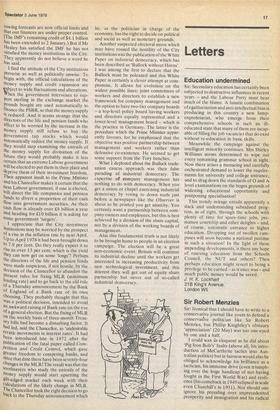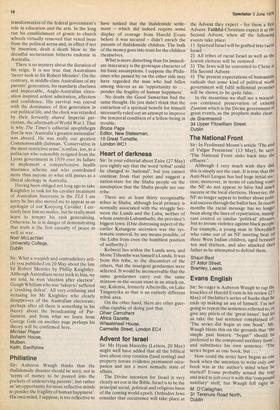Sir Robert Menzies
Sir: Ironical that I should have to write to a conservative journal like yours to defend a conservative politician like Sir Robert Menzies, but Phillip Knightley's obituary 'appreciation' (20 May) was too one-eyed by one and a half.
I could wax as eloquent as he did about 'Pig Iron Bob's' faults (above all, his introduction of McCarthyite tactics into Australian politics) but in fairness would also be obliged to acknowledge his brilliance as a tactician, his immense drive (even triumphing over the huge handicap of not having fought in the First World War) and resilience (his comeback in 1949 eclipsed in scale even Churchill's in 1951). Nor should one ignore his presiding over unprecedented prosperity and immigration and his radical transformation of the federal government's role in education and the arts. In the long run his establishment of grants to church schools virtually removed that vexed issue from the political arena and, in effect if not by intention, dealt a death blow to the dreadful sectarianism hitherto endemic in Australia.
There is no mystery about the duration of his reign. It is not true that Australians 'never took to Sir Robert Menzies'. On the contrary, in middle-class Australians of my parents' generation, his mandarin charisma and 'impeccable, Anglo-Australian elocuation inspired ardent admiration, affection and confidence. His survival was coeval with the dominance of that generation in our political life, and the clock was retarded by their fervently shared Imperial patriotism, the aftermath of World War I. That is why The Times's editorial apophthegm that he was 'Australia's greatest nationalist' was absurd. He was really our greatest Commonwealth clubman. 'Conservative in the most restrictive sense' is unfair, too, to a politician who ostensibly resigned from the Lyons government in 1939 over its failure to implement a comprehensive health insurance scheme and who contributed more than anyone to what still passes as a liberal ideology in Australia.
Having been obliged not long ago to take Knightley to task for his cavalier treatment of Australian historians in the TLS I am sorry he has also moved me to appear as an apologist of our Kooyong Cavalier. I certainly bear him no malice, but he really must learn to temper his rash generalising. Otherwise he is in danger of demonstrating that truth is the first casualty of peace as well as war.
Noel McLachlan University College, Dublin



































 Previous page
Previous page